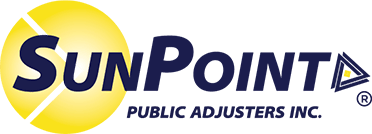
Business Interruption Losses Can CrippleYour Operations After a Loss
SunPoint Public Adjusters Inc. (“SunPoint”) understands that business interruption and financial time element losses can be catastrophic to an insured and their operations after a loss. The coverages are varied and inconsistent amongst the various insurers. Some are narrowly tailored for specific industries while others are more generic. When evaluating a claim for business interruption or extra expenses, a loss consultant must contemplate the loss exposures to the particular client, whether it is a manufacturing facility, auto dealership, agricultural business, distribution center, a small business owner, or professional services. Without due consideration and proper strategy, one can suffer tremendous financial losses that could shut a business down long after the coverage has been exhausted.
COVID-19 Shut Down Orders
The civil authority shut down orders result in business interruption and other financial strains from covered losses at properties other than the insured property. An insurer may be obligated to pay for the actual loss of business income sustained or any necessary extra expenses incurred caused by the action of civil authorities that prohibit access to the described insured premises, provided certain provisions or tests are met. These are generally limited to the fact that the civil authority order must apply to the area immediately surrounding the damaged property being prohibited by the civil authority as a result of a covered event, and the described premises are within a certain area whereby dangerous conditions resulting from the damage or continuation of the event action is taken to enable a civil authority to have unimpeded access to the damaged property.
Coverage for COVID-19 Pandemic
Under most business policies or commercial coverage forms, an insurer will be responsible for the actual loss of Business Income (“BI”) and insured sustains or if the insured incurs any Extra Expenses (“EE”) caused by the action of civil authority that prohibits access to the insured premises due to direct physical loss to neighboring properties that are in proximity by a covered peril. BI generally means (1) net income or loss (before income taxes) that would have been earned or incurred and(2) continuing normal operating expenses incurred, including payroll. EE, on the other hand, means those necessary expenses one incurs during the period of restoration that would not have been incurred without direct physical damage from a covered loss. The EE is normally intended to offset or minimize the suspension of operations or reduce the BI loss; albeit, pure EE forms may not have such limitations.
Generally, business interruption coverage is written either with no dollar limit for losses, i.e., the actual loss sustained, but for a specific time limit. Alternatively, the coverage can be provided with a specific dollar limit but placing a time limit that an insured utilize due diligence and dispatch to resume operations as soon as reasonably possible. It is critical for an insured to not only understand what coverage they need but also how those coverages can work in their favor and ensure the business survives a devastating loss. Generally, the business interruption provisions provide coverage for net loss or gain meaning and must be carefully analyzed to work plus any continuing expenses less any saved expenses. Each relevant term has for the insured and their particular operations.
The premise of such a time element or business interruption coverage is to restore the insured after a loss to the same or similar financial condition has a loss not affected or shut down their operations. The indemnity for loss of earnings general entails reimbursement for net income (or loss) plus continuing normal operating expenses that a business would have earned if no direct physical loss or damage has occurred. Saved expenses or those expenses that would not be incurred by the business due to the loss are often taken as a credit by an insurer.
SunPointCustomizes Your Business Interruption Recovery
A mercantile operation focuses on operating expenses and profit that are derived from resale at a markup of goods purchased and will have different issues or concerns than a manufacturing operation that develops its income from the increase in the value of materials that it converts from raw materials to work-in-progress, and ultimately finished goods for sale to the public. Similarly, a business that primarily provides a service has a different focus as they do not sell any merchandise or manufacture a product; rather, they derive revenue and profits utilizing consumable goods to provide professional services without the need of cost of goods or raw materials to operate profitably. Our forensic accountants are experts at analyzing profit and loss statements, tax records, payroll documentation, business plans, ordinary and extra expenses, a period of restoration in order to customize the coverage for the insured and help restore their earnings, continuing expenses, and time element losses.
Moreover, even if a business is new and is not operating at a profit it can have a major financial loss by a covered event to cover payroll or continuing expenses if a loss suspends its operations. Many carriers will try to reduce the amount collectible by arguing that claim payouts should be reduced by the extent of financial losses notwithstanding that expenses were incurred prior to the covered loss. Our team of forensic experts places a keen and astute eye to the policy language to ensure the coverage works for you.
Civil Authority Orders Seriously DisruptBusiness Operations
The previous tragedies involving fires, hurricanes, and other natural disasters are a reminder of the importance of having an emergency plan in light of mandatory shelter in place orders from civil authorities. The threat of pandemics, wildfires, hurricanes, rising floodwaters, and other calamities that provide business owners with advanced notice often trigger civil authority orders from regulatory agencies. Experiencing this in light of the COVID 19 crisis is a sobering reminder for insureds, consumers, and business owners to remain ever vigilant and the know the ins and outs of their policies. Many business or commercial policies tend to have coverage for financial or income losses when civil authority prohibits access to business premises. Evaluating your options and taking the right steps is critical to proper reimbursement of covered expenses.
Implications of COVID-19 On Business Interruptions
The COVID-19 pandemic is ongoing and various government agencies have issued orders that have shuttered auto dealers, movie theatres, gyms, and various other business venues. Various jurisdictions have issued stay-in-place order further hampering the ability of businesses to generate revenues. Indeed, the unemployment and economic downturn caused by the pandemic and resulting civil authority orders have placed an unprecedented toll on business owners – large and small. Many commercial policies provide coverage for civil authority orders, but they must be evaluated in the context of specific business interruption insurance coverage language for such events as COVID-19.
The business interruption or extra expense coverages are triggered typically as a result of a covered accidental physical loss that causes suspension of operations. Under most forms, “business interruption” means “net income (net profit or loss before income taxes) that would have been earned or incurred and any continuing expenses that are being incurred but for the covered loss. Credit for any saved expenses must generally be provided to the insurer for non-continuing expenses. Similarly, “extra expense” coverage means the necessary expenses an insured incurs during the “period of restoration” that the insured would not have incurred if there had been no direct physical loss or damage to property caused by or resulting from a covered cause of loss. In such instances, the policy responds to pay for “extra expenses” to avoid or minimize the “suspension” of business and to continue operations at the same location, replacement location, or temporary location.
For business owners or commercial enterprises, the coverage for BI under the civil authority provisions begin a certain time period after the civil authority order, typically 72 hours, and may apply up to another period, often three consecutive weeks, after the coverage begins. Similarly, EE coverage under the civil authority coverage usually starts immediately after the civil authority order and ends a definite period, often three weeks, after the order or when the BI coverage ends, whichever is later. The civil authority provision is implicated when the order is issued under threat of potential loss. In fairness to insurers, many do not apply a deductible to this coverage as the intent is to offset losses when the insured property is not destroyed. However, the insurers are also able to cap their exposure to a defined time period thereby limiting their damages. It is important to understand the coverages available under your policies as the initial steps in the claims process can have a serious adverse impact on your recovery. Civil authority losses apply to homeowners, small businesses, manufacturing facilities, service enterprises, rental facilities, and a variety of commercial operations. You must carefully review your policy with an expert to understand the implications and shortfalls due to the provisions. Retaining a sophisticated professional advocate to navigate you through the minefield of claims issues is advisable.
There are variations of the coverage and analysis is contingent on the specific wordings of the policies. Although policyholders may assume that they are entitled to coverage simply because their policy contains a civil authority provision, this is not necessarily so. Insurance policies differ dramatically, and the specific terms and conditions of an insurance policy will prevail over any assumptions or generalizations. Issues of covered “damage” and “accidental direct physical loss,” which are terms of art in many policies, are at the heart of whether coverage applies. An insured may still be required to demonstrate a nexus to a covered loss before triggering coverage. Indeed, these very issues are at the heart of this ongoing coverage battle, and when the President of the United States weighs in, as he has, and other state legislatures are also reminding insurers to act in good faith and extend coverage where arguably available, it is critical that the insured retain professionals to prepare, document, evaluate, and negotiate their business interruption or extra expense losses as a result of the COVID-19 pandemic.
SunPoint Evaluates to Accurately Measure your Loss
Coverages for payroll also vary amongst the insurance products available in the market. Some policies provide coverage for payroll but limit it to 30, 60, or 90 days for “ordinary employees.” Who determines what an ordinary employee? A sales manager is a key employee. Is a sales representative one too? That sales representative at an Auto Dealership may be looked at as an ordinary employee by an insurer. However, an insured may not be able to operate without that particular representative as that employee may be the reason patrons return to the dealership. He/she should be considered a key employee. Training and loyalty are placed at a higher standard by an insured than by an insurer. Other policies provide coverage for key employees subject to certain conditions. Yet, different policies have no such payroll limitations. Key forensic analysis and advocacy of the right and favorable position is what we specialize in.
SunPoint Public Adjusters, Inc. (“SunPoint”) is the “Gold Standard” of the Public Adjusting industry. We comprehensively review and evaluate your policy, immediately deploy a team of experts to assess and quantify your damages, and customize a strategy around your personal recovery to promptly and properly maximize the resolution of your claim. Our in-house and other veteran experts are experienced in quantifying and negotiating building, personal property, inventory, or other additional coverages. We work solely on your behalf to favorably resolve your claim. Our experts ensure your insurance company does not delay, diminish, or deny benefits that are rightfully owed to you. Industry experts agree that having a public adjuster like SunPoint on your side early in the process expedites and maximizes your recovery.
SunPoint Knows What Considerations Must be Given to Ramp Up Your Recovery After a Financial and Business Interruption Loss
While endless other considerations and coverages can be discussed, another key component of business interruption coverage is what happens once the insured’s business or property is rebuilt or replaced and operations substantially resume. Who and how does the insured get indemnified during the ramp-up period during that critical time when the property or operations are restored albeit under reduced revenue streams? Of course, extra expense coverage, which is discussed in the next edition, is of critical concern but many policies provide an extended period of indemnity (“EPI”) coverage. EPI is implicated in the ramp period where the mercantile, manufacturing, or service business suffers losses after re-opening doors or re-commencing operations. Capturing these financial losses properly for the benefit of the insured is a critical function of a true policyholder’s advocate.
Our team of experts has been advocating on behalf of policyholders for decades. We have handled, managed, and successfully navigated claims ranging from corporate losses in the hundreds of millions of dollars, disaster losses involving government entities and municipalities, agricultural and recall losses, mercantile, professional services, manufacturing, and virtually any type of large commercial losses that implicates business interruption claims.
Our team of Public Adjusters, forensic accountants, building experts, inventory specialists, equipment consultants, and many other experts make up a group unmatched in our industry. It is easy to be big. But it takes dedication every day to be the best – we have that dedication. Our goal is aligned with yours. To obtain a free assessment of your specific circumstances and recovery please contact us to strategize your best means of recovery according to your policy.

